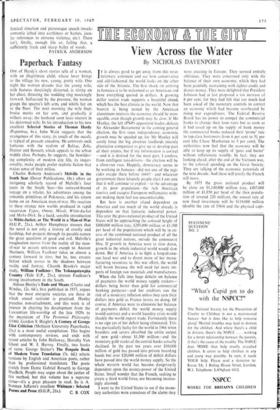Paperback Fantasy
ONE of Hardy's short stories tells of a woman, with an illegitimate child, whose lover brings to the village his new, young, pretty wife. One night the woman dreams that the young wife, with features shockingly distorted, is sitting on her chest, thrusting the wedding ring mockingly forward. Suffocated by the pressure, the woman grasps the spectre's left arm, and whirls her on to the floor. The next morning the wife finds bruise marks on her arm, and gradually it withers away; the husband soon loses interest in his deformed wife. In his introduction to his new excellent Selected Stories of Thomas Hardy (Papermac, 6s.), John Wain suggests that the strangeness of this story, its touch of the occult, is typical of peasant anecdote. He contrasts such fantasies with the realism of Balzac, Zola, Dreiser and Bennett, which appeals to the urban middle class. Perhaps, he suggests, the bewilder- ing complexity of modern city life, its imper- sonality, make people prefer realistic fiction that makes sense of their milieu.
Charles Roberts Anderson's Melville in the South Seas (Dover Publications, 18s.) offers an intriguing scholarly record of Melville's four years in the South Seas—his outward-bound voyage on a whaler, his adventures among the romantic primitives of Polynesia, and his return home on an American man-of-war. His reaction to these strange new worlds produced in rapid succession Typee, Omoo, Mardi, White-Jacket and Moby-Dick. In a lucid, sensible introduction to White-Jacket, or The World in a Man-of-War (O.U.P., 21s.), Arthur Humphreys stresses that the novel is not only a history of cruelty and hardship, but projects through its parable-nature the great questions of good and evil. Melville's imagination moves from the reality of the man- of-war to oceans unknown except to Ancient Mariners. William Faulkner takes us almost a century forward in time, but he, too, creates fiction which moves in the shadows between reality and fantasy. Cleanth Brooks's major study, William Faulkner : The Yoknapatawpha Country (Yale U.P., 21s.), stresses Faulkner's strong involvement in the South.
Aldous Huxley's Ends and Means (Chatto and Windus, 12s. 6d.), first published in 1937, argues that the most energetic societies are those in which sexual restraint is practised. Huxley preaches non-attachment, and this work is of interest in charting his development from the Lawrentian life-worship of the late 1920s to the mysticism of The Perennial Philosophy (1946). Gordon S. Haight's A Century of George Eliot Criticism (Methuen University Paperbacks, 21s.) is a most useful compilation. This begins with contemporary reviews, and ends with recent articles by John Holloway, Dorothy Van Ghent and W. J. Harvey. Finally, two books of verse. George Steiner's The Penguin Book of Modern Verse Translation (7s. 6d.) selects versions by English and American poets, rather than by professional translators. The poets stretch from Dante Gabriel Rossetti to George
MacBeth. People may argue about the justice of this method, but this volume has a supreme virtue—it's a great pleasure to read. So is A. Norman Jeffares's excellent Whitman : Selected
Poems and Prose (O.U.P., 21s.). C. B. COX


































 Previous page
Previous page